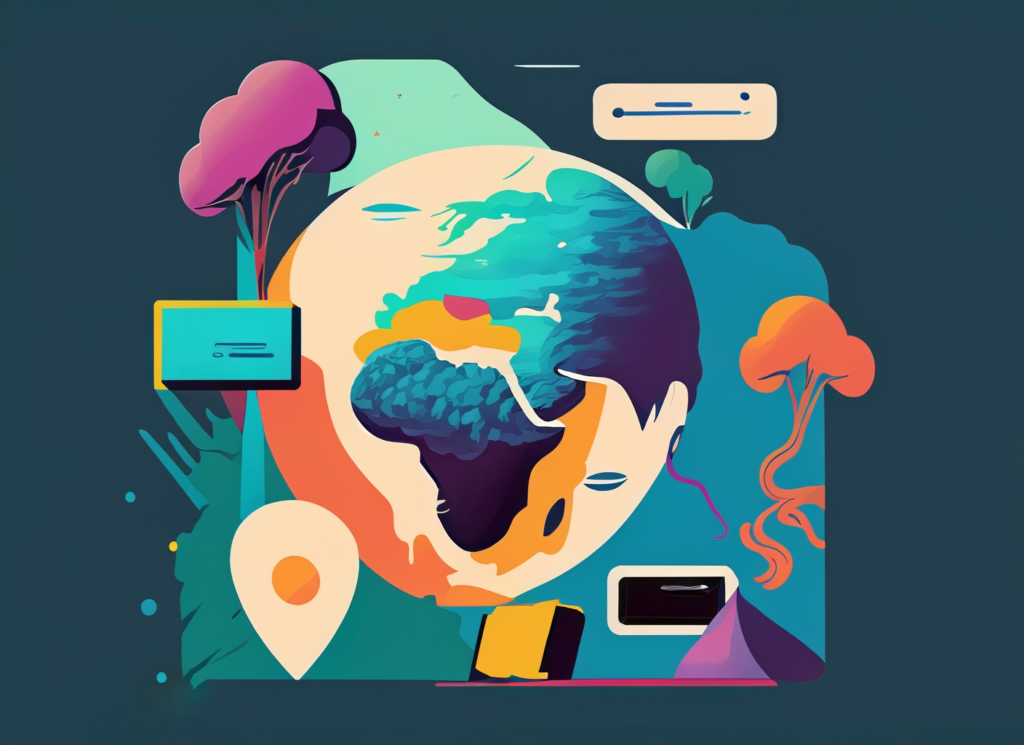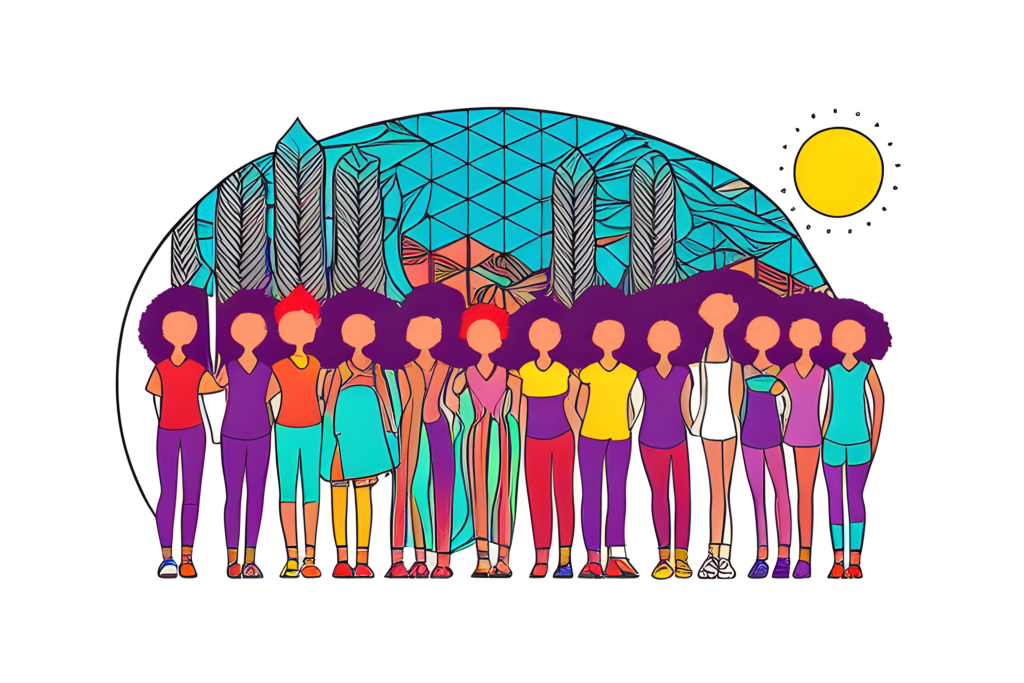In recent years, the term Gen Z has become widely used to refer to the generation born after 1996.
But what has been less discussed is the unique set of challenges this generation is facing.
They are the first generation to grow up in a world where technology is an integral part of daily life.
And yet, despite the circumstances, this generation is proving to be resilient and adaptive.
We are witnessing a generation that is smart, self-aware and capable of tackling complex issues.
They have a strong sense of self-expression and are not afraid to challenge the status quo.
Gen Z is equipped to handle the unique challenges they face in this rapidly changing world.
This generation is ready to make its mark and take the world by storm. It’s an exciting time for the world; Gen Z is ushering in a new era of potential and progress.
With their innovative minds and creative spirit, they are stepping up to the plate and using their talents to make a positive impact.
Gen Z is leading the charge to create a better future and they are uniquely suited to do it.
Their open-mindedness and drive to make a difference is inspiring.
They are pushing boundaries and embracing change instead of resisting it.
They are resourceful and creative problem-solvers, and they are ready to take on the world’s biggest challenges.
This generation is committed to making a lasting impact and leaving the world better than they found it.
They dare to take risks and have the ambition to make their dreams a reality.
Overview of Gen Z
I think it’s important to understand what makes Gen Z who they are.
Some defining characteristics of Gen Z include their tech-savviness and openness to diversity.
Additionally, Gen Z faces several challenges, such as navigating the digital world and the increasing cost of education.
Lastly, education is essential for Gen Z to succeed in a competitive world.
Defining Characteristics of Gen Z
Having discussed the general background of Gen Z, let’s now focus on their defining characteristics.
Gen Z, sometimes referred to as “digital natives,” are the first generation to grow up surrounded by technology, making them uniquely suited to navigating the digital world.
They are adept at using technology for communication, collaboration, and problem-solving, and have a deep understanding of the potential of these tools to create positive change in the world.
Beyond their tech-savvy abilities, Gen Z is characterized by their diversity and global-mindedness.
This generation is more diverse than any previous one, and Gen Zers are more likely to be open-minded and accepting of differences than any previous generation.
As a result, Gen Z is highly collaborative and seeks out creative solutions to problems.
Gen Z also has an entrepreneurial spirit, often using technology to create new products, services, and businesses.
They are more likely to be independent and resourceful and have an innovative approach to problem-solving.
As digital natives, they can access and use the latest technologies and trends to their advantage.
This allows them to quickly adapt and create solutions to the challenges they are faced with.
Challenges Facing Gen Z
Having looked at the defining characteristics of Gen Z, let’s turn our attention to some of the challenges they face.
Gen Zs are the first generation born into a world of accessibility where the internet, smartphones, and social media can all be accessed easily. This easy access to the digital world can make them more vulnerable to the dark side of the internet, such as cyberbullying, trolling, and exposure to inappropriate content.
Another challenge for Gen Z is mental health. With the use of social media and other technology, there is increased pressure on Gen Zs to live up to some kind of unrealistic expectations. They are constantly comparing themselves to others, leading to lower self-esteem and even depression.
Lastly, Gen Zs are facing a world of uncertainty. With the rise of automation, they will be competing with robots and artificial intelligence for jobs. On top of that, they are facing a rising climate crisis that threatens their future. Gen Zs must receive the education and support they need to successfully navigate these challenges.
Education
The next step in understanding Gen Z is to dive deeper into their education. As the first generation of digital natives, Gen Zers have grown up in an environment of rapidly changing technology, which has had a significant impact on how and where they learn.
Gen Zers are used to learning in a variety of ways, from traditional classroom settings to online courses and even self-directed learning. They are also comfortable with different types of technology, from smartphones and tablets to virtual or augmented reality. As a result, Gen Zers are often more self-directed and independent than previous generations, and they are not afraid to take risks when it comes to their education.
At the same time, Gen Zers are faced with unique challenges when it comes to education. With a lack of financial resources and limited access to technology, many Gen Zers face significant barriers to accessing the education they need to succeed. Additionally, Gen Zers tend to have shorter attention spans than previous generations, which can make it difficult for them to focus in traditional classroom settings.
To ensure that Gen Zers have the skills and resources they need to succeed, it is essential to provide them with the support and resources they need to access the education they desire. This includes providing access to technology, as well as financial assistance for those who need it. Additionally, it is important to create learning environments that are tailored to the needs of Gen Zers, such as providing more interactive, engaging course materials and activities.
Impact of Social Media

I’m sure we all know about the impact of social media, whether it be us using it, or seeing its effects on others. It’s important to talk about the different aspects of social media, like social media usage, proactive use of social media, and cyberbullying. Let’s dive in and explore each one.
Social Media Usage
The impact of social media on Gen Z is undeniable. From the moment Gen Zers wake up to the moment they go to sleep, their lives are intertwined with the world of social media. With the rise of social media, Gen Zers are finding new ways to consume and interact with media, creating an even stronger connection to their devices and the world around them.
Gen Zers are known to be heavy users of social media – they spend an average of 10 hours a day on their devices. This is likely due to the sheer number of platforms they use, from Instagram to TikTok. While spending so much time on social media can be detrimental to their mental health, it can also be beneficial. Gen Zers can express themselves through their posts, find communities to relate to, and stay up-to-date on current events.
Social media also provides Gen Zers with a unique opportunity to create meaningful connections with people all around the world. Through social media, Gen Zers can easily find people who share their interests and passions, opening up a world of possibilities for collaboration. This has enabled Gen Z to become more informed, engaged citizens, and has helped them to discover unique ways to express themselves and build meaningful relationships.
Proactive Use of Social Media
Though Gen Z’s use of social media can often be seen as a hindrance to their development, it can also serve as a powerful tool that can be used to their advantage. Despite the perils of social media, Gen Z has used this platform to create a new wave of activism and self-expression.
Taking advantage of the power of social media, Gen Z has leveraged the platform to bring attention to causes close to their heart. From the Black Lives Matter movement to the Australian bushfires, Gen Z has made their voices heard and created an impact. Through organized campaigns and fundraisers, Gen Z has shown the world that its presence is one to be reckoned with.
Gen Z has also used the platform to showcase their talents and skills to the world. From makeup tutorials to comedy skits, Gen Z has made the most of the platform to express themselves and their creativity. They have used the platform to collaborate and create something unique that would have been impossible without the help of social media.
Their proactive use of social media has shown the world that Gen Z has the potential to do great things and make a lasting impression. With the amount of creativity and passion that is present in Gen Z, it is no wonder their presence is so powerful.
Cyberbullying
Now that we have an overview of Gen Z and their usage of social media, let’s explore the darker side of this technology – cyberbullying. Cyberbullying is a major issue that can have a lasting impact on the mental health of the victim. I’m sure many of us have witnessed or been victims of cyberbullying in some way, shape, or form.
As with traditional bullying, cyberbullying can take many forms including, but not limited to, sending harassing or threatening messages, spreading rumours, or embarrassing someone publicly by sharing photos or videos. The anonymity of the internet and the technology used to access it makes it easier for people to act on their cruel intentions and can lead to serious emotional trauma for the victim.
Gen Z is the first generation of digital natives and is therefore more likely to be exposed to cyberbullying. We must understand the risks and impacts of this type of bullying, so we can better protect ourselves and those around us. Education is key in this endeavour, as the more people are aware of the potential risks, the easier it will be to intervene in cases of cyberbullying.
Gen Z’s Unique Challenges

COVID-19 has caused unprecedented disruption to our way of life and has been especially hard on Gen Z, who are facing the unique challenge of graduating and entering the job market in a weakened economy. Climate Change is another challenge Gen Z must face, as many of the decisions made today will shape the planet for generations to come. Lastly, economic inequality has been a growing issue for Gen Z and has been exacerbated by the pandemic, creating an even bigger divide between those who have and those who have not.
Covid-19
The pandemic has undoubtedly been one of the most devastating events of Gen Z’s young lives. COVID-19 has completely upended the way Gen Z interacts with the world and the prospects of their future. With the closures of schools, businesses, and public spaces, Gen Z has had to adapt to a new way of life that has been vastly different from what they had been used to.
Learning has become a virtual experience for most and the economic inequality that many of them lived with before the pandemic has only been exacerbated. Gen Z has had to face the reality of job losses and economic instability, which has put a significant strain on the mental and physical well-being of many in this generation.
The pandemic has also presented a unique challenge to Gen Z in terms of purpose and identity. With the world at a standstill, Gen Z has had to find ways to stay connected, while also finding ways to stay motivated and inspired amid all the chaos. This task has been difficult, as many of them are still trying to figure out their place in the world.
Overall, COVID-19 has had an indelible impact on Gen Z, one that will not be forgotten anytime soon.
Climate Change
In the face of an ever-changing world, Gen Z faces unique challenges that have been exacerbated by the global pandemic. One of the most pressing of these is climate change. The effects of global warming have become increasingly evident over the past few decades, with the effects becoming more severe every year.
For Gen Z, this means that the future of our planet is in their hands. With no clear solution on the horizon, the responsibility rests on them to take the lead on the issue and ensure that the environment is preserved for future generations.
This is no small feat. Gen Zers need to recognize the scope of the problem and take the necessary steps to create a more sustainable future. This includes reducing their carbon footprint, utilizing renewable resources whenever possible, and becoming active in the fight for climate justice. It’s a huge challenge, but one that Gen Z is perfectly placed to tackle. With their passion and creativity, they have the potential to make a real difference and create a greener future for us all.
Economic Inequality
The global pandemic has had a dramatic impact on our lives and brought to light many unique, unseen challenges for Gen Z. One of the biggest issues for this generation is economic inequality. With the current economic crisis, Gen Z faces a daunting future full of financial uncertainty.
The pandemic has caused job losses and a lack of financial security for many members of Gen Z. Many of them have been forced to take on the responsibility of helping their families financially. They’ve had to take on jobs that are difficult to come by due to the current employment climate, and some have had to put their education on hold to make ends meet. This lack of financial stability has put a strain on their mental health as well.
The financial instability of Gen Z is further compounded by the rising costs of living. Inflation has been on the rise and many members of Gen Z are struggling to make ends meet. This lack of financial security has left them feeling helpless and uncertain about their future.
Luckily, Gen Z is a resilient generation of young people and they are determined to overcome the financial difficulties they face. They are actively looking for ways to improve their financial situation and working hard to secure a better future for themselves.
Optimism in the Face of Adversity

I’m a firm believer in resilience, passion, and adaptability when it comes to staying optimistic in the face of adversity.
It’s amazing how much these qualities can help you persevere and find the silver lining in any situation.
With a little resilience, a little passion, and a little adaptability, you can stay optimistic no matter what life throws at you.
Resilience
Despite the unique challenges that Gen Z faces, their resilience stands out.
Despite the obstacles and the difficult times, they find ways to stay strong and maintain their optimism.
They don’t give up and continue to thrive.
Gen Z’s resilience is demonstrated in the way that they don’t let failure define them.
They are willing to take risks and learn from their mistakes.
They don’t get discouraged by challenges, but instead, they look at them as an opportunity to grow.
They have the courage and determination to come out on the other side, stronger and wiser.
Gen Z’s resilience is also evident in their ability to stay positive even when faced with difficult times.
They don’t take failure personally and instead use it as a learning opportunity.
They understand that sometimes it takes time, energy and focus to reach their goals and they are willing to put in the work.
They don’t let the hard times discourage them, but instead, they see them as a chance to learn and grow.
Passion
Despite the many unique challenges Gen Z faces, they continue to demonstrate great resilience and passion.
Gen Z is a generation of passionate individuals who stand up for what they believe in and do not shy away from difficult tasks.
They are driven by their love for something and are willing to put in the work to see their ideas come to life.
Their passion is not only shown through their work ethic and determination but also through their willingness to take risks.
Gen Z is unafraid of failure and is willing to take chances to reach their goals.
They are bold and daring and are not afraid to go against the grain.
They understand that to be successful, they must take risks and put in the hard work to see their dreams become reality.
Gen Z’s passion is inspiring and contagious.
They are a generation of determined individuals who are motivated to make a difference in the world.
They dare to speak up and fight for what they believe in, and they have the drive to make their dreams come true.
Their passion will continue to inspire and motivate future generations to come.
Adaptability
Despite the unique challenges Gen Zers face, they have also shown remarkable resilience and passion in overcoming them.
One of their most impressive traits is their adaptability; Gen Zers have been able to quickly adjust to the many changes in their lives.
They can quickly learn new technology and take advantage of the digital world.
Gen Zers understand how to navigate the digital landscape in a way that older generations may not.
Their ability to quickly adjust to the digital world is part of why they’re so successful in their endeavours.
Gen Zers are also able to adjust to unexpected life changes.
They’ve had to learn how to cope with the pandemic and its associated changes, such as remote learning, social distancing, and economic uncertainty.
Despite the difficulties they’ve had to face, they’ve displayed an impressive ability to remain positive and make the most of their situations.
Adaptability is key to Gen Z’s success, and it’s a trait that will serve them well in their future endeavours.
Social Activism

I’ve been so inspired by Gen Z’s role in social change, like pushing for climate change initiatives and speaking out against racial injustice.
They’re actively engaging in political processes and showing immense support for social movements.
It’s amazing to witness how much of an impact they’re making!
Gen Z’s Role in Social Change
Having found a glimmer of hope in the face of adversity, Gen Z looks to use their energy and enthusiasm to drive social change. Gen Z’s role in social change is essential, as they are the generation who will be leading the world shortly.
Generation Z is already making waves in the activist landscape. As the first generation of digital natives, they are uniquely qualified to use technology to advocate for social change. Gen Z is more connected, informed, and aware than any previous generation, and they are using their platforms to spread awareness and lead conversations. Through the use of social media and technology, Gen Z can create campaigns, advocate for causes, and raise money for causes.
Gen Z is also a generation of young, passionate activists who are unafraid to advocate for change. Gen Z is unifying behind causes they care about, and they are pushing for social change. They are standing up for what they believe in, and they are fighting for a better future. Gen Z is proving to be a powerful force for social change, and its impact is only expected to grow.
Proactive Engagement in Political Processes
Taking the optimism they’ve found in the face of adversity and channelling it into action, Gen Z is taking proactive steps to engage in the political process of the world around them. As the most socially conscious generation to date, they are using their collective power to create real, lasting social change.
For Gen Z, engaging in politics goes beyond the traditional methods of voting and protesting. They are utilizing the internet and social media to spread awareness of important issues. They are connecting with political candidates and their platforms to ensure their voices are heard and taken into consideration. They are even challenging the status quo, questioning the efficacy of antiquated policies and sparking dialogue about alternative solutions to complex problems.
By taking a proactive approach to politics, Gen Z is becoming a powerful force for change. They are inspiring others to get involved and make their voices count. This generation is proving that ordinary people can make a difference and that together, we can create a more just, equitable, and inclusive society.
Support for Social Movements
Having seen the power of optimism in the face of adversity, it is no surprise that Gen Z is actively engaging in social movements to create change. We are passionate about making the world a better place and recognize that the only way to do so is to get involved. Gen Zers are showing their support for social movements through donations, advocacy, and education.
We are powerful supporters of movements like Black Lives Matter, LGBTQIA+ rights, and environmental justice. In 2020 alone, Gen Zers donated over $1 billion in support of causes they believe in. This is a staggering amount that shows our commitment to making a difference. We also use our platforms to spread awareness, which can be seen through the #BlackLivesMatter hashtag that has trended on social media countless times.
In addition to donations, Gen Zers are also showing up to support social movements in person. We are marching in the streets, protesting injustice, and advocating for those who are unable to do so for themselves. We are using our platforms and voices to call for change and refuse to stay silent. Our commitment to social movements is unwavering and we will continue to fight for what is right.
Technology and Innovation

I’m passionate about technology and innovation and its potential to shape the future. I’m excited to explore the use of existing technologies, the adoption of new technologies, and the development of innovative solutions. Let’s dive in!
Use of Technology
The digital revolution has enabled social activists to tap into the power of technology to further their cause. This has created an unprecedented opportunity to leverage technology to achieve change faster and more effectively than ever before.
The use of technology by social activists has become increasingly common. From creating online petitions to broadcasting live protests through social media, activists are utilizing technology to amplify their message and spread awareness. This has allowed activists to reach wider audiences and engage with a more diverse range of people on a deeper level.
Technology has also enabled activists to connect on a global scale. Through online networks and platforms, activists can share information, resources, and strategies to work together to make a greater impact. This has facilitated a much more collaborative approach to activism and made it easier for activists to coordinate their efforts and create a unified movement for change.
Adoption of New Technologies
As we move from social activism to technology and innovation, the adoption of new technologies has become an essential element of our lives. We are now more connected than ever before and the ability to easily access and use new technology is critical for advancing our society.
The adoption of new technologies is a process that involves many factors, such as the availability of resources, the cost of the technology, and the willingness of individuals to embrace it. The key to success is to identify the right technology for the job, and then to ensure that the necessary resources are available to make it happen. Additionally, those who are willing to take advantage of the new technology must be properly trained in its use.
Finally, it is important to consider the potential implications of new technology before its adoption. It is important to consider the wider implications that such technology may have, and to weigh up the potential benefits against any potential risks. With the right approach, the adoption of new technologies can lead to advances in our society that we could never have imagined before.
Developing Innovative Solutions
From the realm of social activism to the world of technology and innovation, the development of innovative solutions is essential to success. As technology continues to evolve and expand, creative solutions are needed to bring together the experiences of all stakeholders. With the use of technology, stakeholders can work together to develop solutions that are tailored to their unique needs and values.
The innovation lies at the heart of the development process. By cultivating a culture of creativity, stakeholders can explore new ideas and recognize opportunities for improvement. In this environment, collaboration and experimentation are key to developing successful solutions. By taking a holistic approach, stakeholders can identify and address the underlying issues and create meaningful solutions.
Finally, it is important to recognize the power of technology to drive innovation. By leveraging the latest technology, stakeholders can create solutions that are both effective and efficient. Through the use of data analysis and machine learning, stakeholders can gain deeper insights into their needs and develop solutions that are tailored to their individual needs. By investing in technology, stakeholders can create solutions that are not only innovative but also sustainable.
Mental Health

I’m sure we can all relate to the challenges that come with mental health. It’s important to know how to cope with stress and anxiety, and practice self-care to keep our mental health in check. Taking time for ourselves is essential, and here I’ll discuss the best ways to do so.
Challenges of Mental Health
As the world moves forward, embracing technology and innovation, it’s important to remember the internal struggles and challenges many people face. Mental health is an issue that affects people from all walks of life, and it’s important to understand the challenges associated with it.
One of the biggest challenges of mental health is identifying the issue. Mental health struggles can manifest in a variety of ways, such as feeling overwhelmed, anxious, and unmotivated. It can be difficult to recognize that one is struggling with their mental health, as many people don’t want to admit to themselves or others that something is wrong. Even if a person recognizes the issue, they may not feel comfortable reaching out to get help.
Another challenge of mental health is stigma. People may feel like they need to hide their mental health issues out of fear of judgement or negative reactions. This can lead to feelings of isolation, furthering the difficulty of getting help and support. It’s important to create an open and accepting environment to help people feel comfortable talking about their mental health.
Coping with Stress and Anxiety
The intersection of technology and innovation has had a profound effect on our lives, but mental health is another area that has seen greater awareness in recent years. Understanding how to cope with stress and anxiety is a major challenge for many, but there are steps that individuals can take to reduce their levels of stress and anxiety.
One of the best ways to cope with stress and anxiety is to practice positive self-talk and self-affirmation. This can help to shift your perspective and to remind yourself that you can handle whatever comes your way. Taking time to be mindful and practice deep breathing can also be a great way to reduce stress and anxiety levels. Spending time in nature and engaging in activities that you enjoy can also help make a difference.
Finding ways to connect with others can also help manage stress and anxiety. Talking to people who you trust and who are supportive can be a great source of comfort. It’s also important to recognize that it’s okay to ask for help and to reach out for professional support if needed. There is no shame in seeking help and talking to a mental health professional can help provide clarity and insight into how to better cope with stress and anxiety.
Self-Care Practices
In a world increasingly driven by technology and innovation, it is important to take a step back and understand the importance of mental health and well-being. Self-care practices are essential in aiding us to stay mentally healthy and cope with stress and anxiety.
I find that dedicating time to self-care helps to reset my mind and soul. Making time to enjoy activities such as outdoor walks, yoga, meditation or simply reading a book are all good ways to nurture and care for myself. Additionally, I like to put time aside to practice gratitude, and to appreciate the good and beautiful things in my life.
Another great way to keep mental health in check is to practice mindfulness. Being mindful involves being aware and present in the moment, allowing me to be less anxious, and to be more attentive to my thoughts and feelings. When I’m feeling overwhelmed, I like to take a few deep breaths and be still for a few moments. This helps me to be more present and calm.
Ultimately, self-care practices are an important part of maintaining a healthy mental state. Taking the time to look after ourselves is essential in this modern age – technology and innovation can wait, but our mental health should not.
Education
When it comes to education, the learning environment has a huge impact on how well it’s received. Technology’s role in advancing education can’t be overstated, and Gen Z is at the forefront of education reform. Let’s take a deeper look at each of these elements.
Learning Environment
Having discussed mental health, it’s time to move on to learning environments. A student’s learning environment is crucial for their academic success and overall growth. From the atmosphere of the classroom to the learning resources available and the methods used by teachers, the environment in which students learn has a significant impact on their development.
Creating a positive learning environment is essential for students to feel motivated and inspired to learn. It should be a place where students are encouraged to ask questions, make mistakes, and express their creativity. This type of environment would be well-lit, full of resources, and have ample space for students to move around and explore.
Providing students with stimulating activities can help them to stay engaged and focused during class. For example, offering hands-on activities such as experiments or field trips can help to keep students’ attention while giving them a chance to practice their skills in a fun and interactive way. Additionally, introducing games and puzzles can give students a break from traditional learning methods and allow them to explore a subject more creatively and engagingly.
Ultimately, creating a positive learning environment is essential for student success. It should be a place that encourages exploration and curiosity and provides the resources that students need to learn and grow.
Impact of Technology on Education
With the growing prevalence of technology, the impact of technology on education has become an increasingly important topic of discussion. In particular, the impact of technology on our classrooms, learning environment, and ultimately, the future of education, is an especially pertinent issue.
In the modern era, technology has revolutionized the way we learn and access information. From the computers we use in our classrooms to the digital textbooks that students access online, technology has become an essential part of our learning process. With the help of technology, students can access information more quickly and efficiently than ever before. Technology also allows students to collaborate on projects and assignments with ease, making the classroom a more conducive learning environment.
At the same time, technology can also hurt education. While technology can be a useful tool for learning, it can also be a distraction. With social media and digital devices, students are often easily distracted and can easily lose focus in the classroom. Additionally, technology can be a source of stress for students, as they may feel pressure to keep up with their peers who are using technology to their advantage.
Overall, technology has changed the way we learn and access information, but it is important to remember that technology should be used responsibly in the classroom. By using technology responsibly and productively, we can ensure that our students are getting the best education possible.
Gen Z’s Role in Education Reform
Now that mental health has been discussed, it’s time to shift the conversation to education. With Generation Z coming of age and attending school, the education system is ripe for reform. Gen Z has the potential to make a huge impact on the future of education.
Gen Z has grown up with technology and its impact on every aspect of their lives. They understand the power of technology, and how it can be used to revolutionize education. They are ready to use technology to create more interactive and engaging learning experiences and to break down the traditional barriers to education.
Gen Z also has the power to create a more inclusive education system. They are willing to stand up for what they believe in and to challenge the status quo. They are passionate about making the education system more equitable, and ensuring that all students have access to the same opportunities. Gen Z has the potential to make a real difference in the education system and to create a more equitable and inclusive future.
Conclusion
Overall, Gen Z is a resilient generation that is facing unique challenges. They are using the power of social media, technology and innovation to create positive changes in the world and fight for the causes they believe in. They are becoming more aware of the importance of mental health and are making sure to prioritize their well-being. Through their determination and adaptability, Gen Z is paving the way for a positive and successful future.




